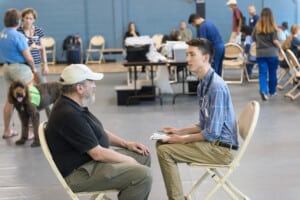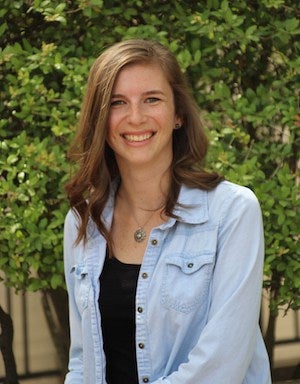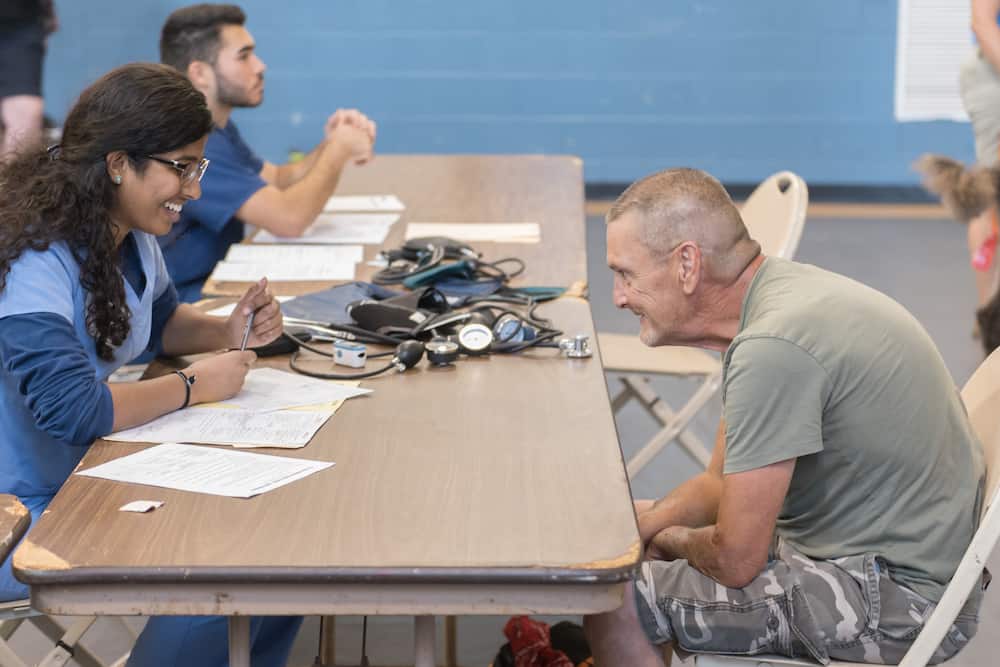It’s a Sunday afternoon in July and people start to trickle into the C.D. Doyle Clinic, a student-run clinic on Seventh and Trinity streets, in downtown Austin. People come in for the free health services but also for water and snacks, a break from the merciless summer heat, and simply the chance to talk to someone.
“The majority of our clients come from the homeless population,” says Kara Robbins, a social work master’s student and the clinic’s director of social services. The clinic, which was founded in 2011 by students from the UT Medical Branch, operates every Sunday and provides services to anyone regardless of insurance, ID, or residency.

Earlier that day, Robbins had joined UT students from medicine and nursing, and pre-health undergraduates to set up the clinic in the spacious gym of the Trinity Center, which is part of St. David’s Episcopal Church. Tables and chairs were arranged to neatly demarcate different areas: intake, where pre-med students take patients’ vitals and information; an open sitting area for one-on-one meetings with medical students; examination “rooms” created with white fabric screens on two of the gym’s corners; a huddle section where medical students and the day’s attending physician discuss diagnoses; a pharmacy stocked with over-the-counter medications; and the discharge and social services desk.
“We see clients at the end of the process and connect them to any resources they may need. We have two laptop computers in addition to all these printed materials,” Robbins says pointing to a plastic crate full of paper files. “In many cases we help people connect with MAP [Central Health Medical Access Program], which offers health coverage for low-income residents of Travis County.”
Robbins, who came to the master’s program with an interest in health social work, took an interprofessional course last semester with students from nursing, pharmacy and medicine.
“I really benefitted from the course, but I wanted to get hands-on experience. Volunteering here at the C.D. Doyle clinic allows me to take what I was learning in the classroom and put it into practice,” she says.

When the clinic opens its doors at two in the afternoon, a few people are already waiting on the steps outside. As they come in, two medical students greet them with a warm shake of hands and orient them according to their needs: some have injuries — an infected piercing, a skin rash, knee pain — some want to have their blood pressure or sugar level checked, an older man just wants to use the restroom.
At the social services desk, a homeless woman is so taken with donated clothing items neatly arranged on a table that she foregoes her intake appointment, even though a medical student comes twice to fetch her. The tennis shoes she is wearing are so worn-out that her toes pierce through the fabric on the top. Robbins offers her a plastic bag, which she fills with garments. In between them, she carefully hides individual packages of crackers and Skippy peanut butter that she grabs from the desk.
“Do we have a policy about how much people can take?” a student volunteer asks Robbins after the woman has left.
“That has never happened before, usually people just take a few items,” Robbins answers with a puzzled expression. Then she adds, “But it’s ok, she probably really needed them. So you just let them grab as much as they want.”
Robbins thinks that there is opportunity to expand social work’s role at the clinic. She is working with the team to establish feedback and supervision protocols for the many students who volunteer every Sunday, and eventually she would like to implement short, focused mental health interventions with the patients who may need them.
As the afternoon goes by, the volunteers at the social services desk consult with the medical students over the patients’ charts, give information about MAP to a young man new to Austin, help another man find a clinic where he can have his hand x-rayed, put newcomers at ease, and chat with a few regulars that they know by name.
“Some of them just really want to sit down and have a conversation,” Robbins says. “The other Sunday, this gentleman was telling me about how people ignore him, and we had a great conversation about what he is reading, what’s good in his life, and how he actually gives money away to people who are struggling more than he is. That’s where social work comes in: we can be that person who is there for him, in that moment.”
— Posted July 12, 2017. By Andrea Campetella.


